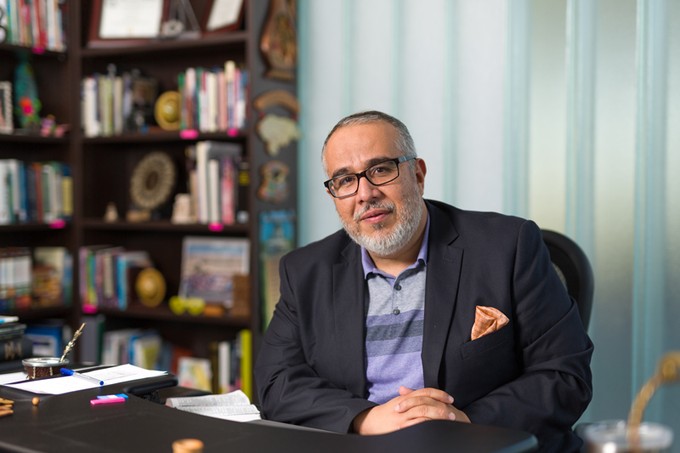
This fall, Biola University officially launched the Center for the Study of the Work and Ministry of the Holy Spirit Today. A 10-year initiative funded fully by a private donation, the center may be a mouthful to say, but its goal, says director Oscar Merlo, is rather straightforward: to empower new generations with the fire of the Holy Spirit, to catalyze evangelism and “to repair any sort of broken relationship we might have with the Holy Spirit.”
Merlo comes to Biola from the Alberto Mottesi Evangelistic Association (AMEA), one of the world’s largest Latino evangelistic associations, where he served as executive director. Before that, he held executive leadership positions in businesses like Target Corp. and ConAgra Foods.
Shortly after he arrived at Biola over the summer, Biola Magazine sat down with him in his Talbot East office to ask him about his vision and goals for this new initiative.
How have you spent the first few months of your time at Biola?
For the first several months, I am in a listening mode. I want to discover how the Spirit has been at work at Biola since the beginning. What has he been saying? What is he saying now?
I started in the Biola library archives. I wanted to know what Lyman Stewart and the founders said about the Holy Spirit. I’m finding so much. Stewart’s life and spirituality was influenced by the Great Awakening of 1856–58, born out of the Holiness movement, a time when churches from mainline evangelical denominations in America reported “spiritual outpourings.” [R.A.] Torrey also had a heart for the Holy Spirit. There is a whole section on the Holy Spirit in his book What the Bible Teaches. So from the beginning, you see that Biola’s founders depended on God’s guidance and sought him in prayer. This is important for us to remember. We come from a tradition like this.
What programs and initiatives will we see from this new center?
Our working plan focuses on four things. First, we will be having intentional conversations, at all levels, about the Holy Spirit. We will do this with our faculty as well as through a residency program where global leaders and scholars will come and converse with us not just about the theology of the Holy Spirit, but also how the Spirit empowers us in practical areas like evangelism, global mission, praying for the sick and defeating the power of sin.
Second, we will host a biennial conference, partnering with other institutes and centers at Biola. I envision a Holy Spirit conference that will draw international attention and will feature workshops and speakers over a few days.
Third, we will conduct research. I’m really looking forward to this. Specifically, I’d love to see more women researching the Holy Spirit. We need that perspective. We will support our faculty in their various fields. In philosophy, what is the role of the Holy Spirit in reasoning? In science, what does the Spirit have to do with the healing of the body and mind? In business, how does the Spirit work through believers in business who are creating resources and wealth and investing in the kingdom? We’re not diminishing academic professionalism; we’re just adding a component that is so needed in our Christian universities. We are preparing not only hands to do the tasks, but also hearts to be sensitive to the movement of the Holy Spirit in the 21st century.
Finally, we will be holding Spirit-empowered vespers on campus. Once a month I want to network with existing groups of students and pray and wait on the Holy Spirit together. I’ve never heard the voice of God audibly, but he speaks to me, to us. He’s always speaking. We need the Spirit’s guidance and we must learn to listen. In this complex world we need all the help we can get.
What role can the Holy Spirit play in an academic environment like Biola University?
Faith, Spirit and intellect go together. We are whole individuals. This integration will produce greater scholarly work and also a greater dependency on the Spirit. Our institutions need to depend more on God. Sometimes we depend too much on our intellect. Are we taking time, when we are about to do our scholarly work, to pray to the Spirit of God? Or are we more interested in jumping right into our research questions? I’m an academic, so I get this. But we need the relationship with the Spirit. We need his voice more than ever! We have all these voices in our world today. But are we taking time to quiet ourselves and establish a relationship with the Holy Spirit? An integration of the Spirit in academia could be powerful. Dependence on the Spirit teaches us about Jesus, who himself was dependent on the Spirit. This is what I hope this Holy Spirit center will help teach us: humility and greater dependence on the Spirit. If we accomplish that alone, we’ve done well. I’m so thankful that Zechariah 4:6 is on the window in Talbot East: “‘Not by might nor by power, but by my Spirit,’ says the Lord Almighty.” This is the model Scripture for the Christian life and for Christian scholarship.
 Biola University
Biola University
.jpg)

